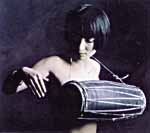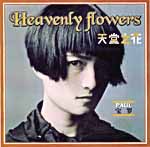|
She stares at me with eyes glistening with excitement
before breaking into laughter, the sound rising and
fading as sharply as a firecracker. Against the dulcet
tones of Indian musical pipes playing in the background,
her laughter cuts through the air with its innocent
disregard for decorum.
The source of this mirth
is an elfish young woman, with a petite frame and wallflower
demeanor. As she sits in front of me, speaking in softly
accented tones, I am enraptured by her voice.
Baoluo, 30, experimental
singer and doyenne of China's home-grown world music
scene, has that effect on people. Not only is her personality
infectious, but she remains something of a cypher.
Perhaps because Baoluo's
life is full of contrasts. Her pixie-like features are
framed by the black, chic bob of a catwalk model. A
blue batik jacket is draped casually over a black silk
dress. She says she gains inspiration from the diversity
of Beijing society, yet hardly goes out and shuns the
gossip-fueled culture of the city's elite. She cites
such influences as Brian Eno, David Bowie and The Cure
in the same breath as the Chinese opera music she studied
as a child. Then she talks about her ongoing quest to
find true punk music in China.
Perhaps it was this
eclecticism that intrigued Warner Music Hong Kong when
it picked up a demo tape of Baoluo's experimental music
in 1997. Using only a keyboard synthesizer and basic
recording equipment, Baoluo and collaborator Su Fang,
38, produced a unique, memorable sound that convinced
Warner to sign them up.
A year later, her debut
album Heavenly Flowers hit the Chinese market. Plugged
by Warner as a uniquely Chinese offering to the so-called
world music scene, her work is a blend of traditional
Chinese folk music, Indian rhythms and ethereal vocals.
Commercially, her music
fills a more practical need. It satisfies a deep, latent
demand for intelligent music in a market saturated with
saccharine-sweet Hong Kong ballads and overly-pretentious
rock'n'roll.
Baoluo's artistic success
is the fruit of a lifetime spent searching for her own
unique sound. Born in Anhui province to actor parents,
she came to Beijing in 1986 as a competitor in an annual
popular singing competition. Her arrival coincided with
the first stirrings in Beijing's rock scene, when music
from abroad was just filtering into China and musicians
such as Cui Jian were gaining rock-god status. Caught
up by a sense of adventure, Baoluo dramatically changed
from pop songstress to punk diva. Her short-lived stint
in the early 1990s with punk band Self-Education (zi
wo jiao yu) still colors her work with an untamed recklessness.
"Music is my life. It
is like a religion, into which I put all of my feelings,"
Baoluo says. "If I feel like being wild, then I am wild.
I really think that this comes across in my music."
Transforming the back
room of her apartment in the northwestern suburbs of
Beijing into a make-shift studio, the artist worked
tirelessly with Su, who she met in 1986. Experimenting
with Indian drums, arcane pipes from southern China
and a simple keyboard, they started working on the demo
of Heavenly Flowers.
"I don't know how or
why we were thrown together," says Su, smiling mischievously.
"It was as if I could see something in her that nobody
else understood. She has an instinct for music that
I have rarely encountered."

The album saw Baoluo
trade the crashing guitar chords of her punk roots for
the gentle flow of wooden flutes and Indian pipes that
typify her New Age music. She employs such diverse elements
as the drones of Gregorian chanting, the dreamy plucking
of a Chinese erhu, synthesized tones and tribal drumbeats.
And over all of this, Baoluo's voice meanders, rising
and falling, sometimes harsh like a primal cry, until
it climaxes at the song's finale with an ear-piercing
scream.
"My greatest inspiration
comes from nature," Bao says, before bursting into her
trademark laughter. "When I listen to music from places
far away, I feel like it is something that is played
straight from the heart. This kind of music is very
close to me."
Listening to Heavenly
Flowers is a lot like leaving the grit and dirt of the
city and being led on a wandering journey through the
countryside. With songs ranging in length from 30 seconds
to ten minutes, and sometimes ending abruptly mid-note,
the path of her music often seems unplanned. Few songs
have lyrics; others feature Baoluo voicing over synthesizers
and strings.
An air of raw simplicity
lies at the root of her music. Despite the ready availability
of high-tech digital equipment, the album utilizes only
a synthesizer and a basic sampler. Only one song, "Daylight,"
was recorded with the aid of a digital remixer, in a
grudging concession to the commercial demands of Warner.
"We were never trying
to be popular, funky or modern," Su says. "We never
considered how what we were doing was going to be sold.
That's what made us different from other artists in
the first place."
Although Warner gave
the couple a great deal of creative freedom, Baoluo's
recent decision to break with the label also comes as
little surprise. Their new group is Beijing Talk (beijing
tanhua), recorded with musicians from Mongolia, India
and Tibet.
"Music is about breaking
through boundaries," Baoluo says with defiance. "What
I play isn't confined by traditions or rules. When I
mix different sounds together, I'm not concerned with
whether it derives from Yunnan or Mongolia. As long
as it speaks to me and sounds good."
In many music scenes
abroad, such non-conformity could meet with commercial
success. In her home country, however, Baoluo's following
remains small but loyal.
"It is hard for people
here to understand music that is very individual," Bao
says. "But I know that there is at least a small group
who will want to hear it. We've had people write to
us amazed. They never knew this kind of music existed."
Baoluo's Heavenly Flowers
(tiantang zhi hua) is available at most Beijing record
stores.
|




